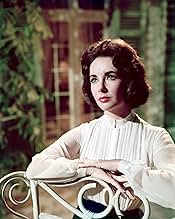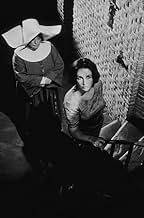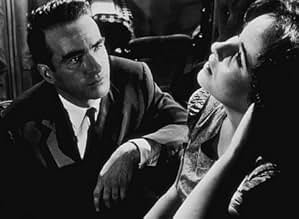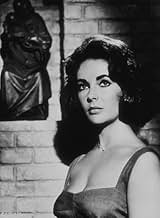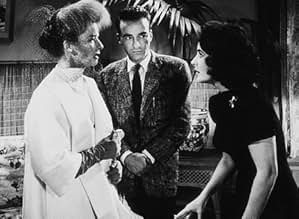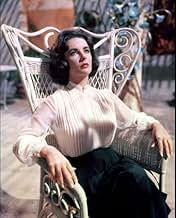IMDb-BEWERTUNG
7,5/10
18.484
IHRE BEWERTUNG
Ein Chirurg wird mit dem Fall einer jungen Frau beauftragt, deren Tante möchte, dass sie lobotomiert wird, um ein Familiengeheimnis zu verbergen.Ein Chirurg wird mit dem Fall einer jungen Frau beauftragt, deren Tante möchte, dass sie lobotomiert wird, um ein Familiengeheimnis zu verbergen.Ein Chirurg wird mit dem Fall einer jungen Frau beauftragt, deren Tante möchte, dass sie lobotomiert wird, um ein Familiengeheimnis zu verbergen.
- Für 3 Oscars nominiert
- 4 Gewinne & 7 Nominierungen insgesamt
Sheila Robins
- Dr. Hockstader's Secretary
- (as Sheila Robbins)
Erik Chitty
- Asylum Inmate
- (Nicht genannt)
Grace Denbeigh-Russell
- Asylum patient
- (Nicht genannt)
Brenda Dunrich
- Nurse
- (Nicht genannt)
Eddie Fisher
- Street Urchin
- (Nicht genannt)
Anthony Lang
- Inmate
- (Nicht genannt)
Aileen Lewis
- Nurse
- (Nicht genannt)
Empfohlene Bewertungen
Film versions of Tennessee Williams great plays can be a little frustrating, especially for those of us lucky enough to have seen a fine production of the play on stage. I saw a fine production of this piece in London in 1999, with Sheila Gish as Mrs Venable, Rachel Weisz as Catherine and Gerard Butler as Doctor Cukrowicz.
But this film version is actually extremely good. The cast more or less speaks for itself. Katherine Hepburn is not quite as repulsive as I imagine Mrs Venable to have become, but this is a movie version after all and somehow Katherine Hepburn seemed to become increasingly ghastly as the movie goes on - strong work on her part and the Director's part I shouldn't wonder. Taylor and Clift are predictably good.
Most Tennessee William's plays had their endings tampered with for Hollywood and this piece is no exception. However, there is only a subtle difference between the ending of the film and the ending of the play, unlike the cringe-inducing changes to some ("Streetcar" and "Cat" being the main offenders).
This is not William's best-known piece, but it is one of my favourites and this film version also slots in right up there with the very, very best.
Well worth seeing, is this.
But this film version is actually extremely good. The cast more or less speaks for itself. Katherine Hepburn is not quite as repulsive as I imagine Mrs Venable to have become, but this is a movie version after all and somehow Katherine Hepburn seemed to become increasingly ghastly as the movie goes on - strong work on her part and the Director's part I shouldn't wonder. Taylor and Clift are predictably good.
Most Tennessee William's plays had their endings tampered with for Hollywood and this piece is no exception. However, there is only a subtle difference between the ending of the film and the ending of the play, unlike the cringe-inducing changes to some ("Streetcar" and "Cat" being the main offenders).
This is not William's best-known piece, but it is one of my favourites and this film version also slots in right up there with the very, very best.
Well worth seeing, is this.
This screen version, by Joseph L Mankiewicz, of Tennessee Williams' play isn't as highly thought of as it should be. It's not a classic and on occasions it comes over as crude and stilted, but it also has many fine things going for it. Although he never really opens it out, Mankiewicz gives it a fluency that isn't at all theatrical and although he often films scenes intimately and between only two characters, he ensures it is photographed and cut in a very cinematic fashion.
Unfortunately, one of the two people on screen during these 'cinematic' sequences is Montgomery Clift who is at his worst here. It was after his accident and he looks as if he's in pain. When he walks it's as if there is a board up his back and he talks as if out of the side of his mouth. Luckily, with him in these scenes is either Elizabeth Taylor or Katharine Hepburn or both and when they are on screen you don't pay too much attention to Clift.
Dilys Powell said Elizabeth Taylor was born to play Tennessee Williams and she was right. Indeed this may be her best performance after "Virginia Woolf". Catherine's lines don't have the kind of poetry in them that Violet Venable's does but Taylor finds a poetry of her own in her readings. She builds on her long speech at the end and is very moving, even if Mankiewicz can't resist 'showing' us, in flashbacks, what Taylor is telling us, as if he doesn't trust an audience to sit still and just listen to Taylor. (They would have to in the theatre).
As Violet, Hepburn has the showier part and she milks it for all it's worth. It's a great piece of acting because Violet never seems to be acting, though she tends to think of her life as a kind of performance, something she has passed on to her homosexual son, Sebastian. (If the old adage, 'my mother made me a homosexual', has any validity you don't have to look any further than here). She enters from above, descending in her small baroque lift, and Hepburn can see the comic potential in such an entrance. Moments later, however, she is recounting how the sea-turtles were devoured by flesh-eating birds in the Galapogos, and you can see just how dangerously unstable this woman really is.
Any film that has acting of this calibre automatically qualifies as worth seeking out, (you forgive the lame work of Clift and Gary Raymond and draw a blind over Mercedes McCambridge, though Albert Dekker is very fine), but this qualifies on other grounds; as one of the better Tennessee Williams adaptations, (he co-wrote it with Gore Vidal), as a flawed, dated but strangely fascinating example of how Hollywood viewed homosexuality at the time, (negatively, naturally, but any face, no matter how horribly distorted, so long as it was in the public gaze, was better than no face at all), and as a serious addition to the Joe Mankiewicz canon.
Unfortunately, one of the two people on screen during these 'cinematic' sequences is Montgomery Clift who is at his worst here. It was after his accident and he looks as if he's in pain. When he walks it's as if there is a board up his back and he talks as if out of the side of his mouth. Luckily, with him in these scenes is either Elizabeth Taylor or Katharine Hepburn or both and when they are on screen you don't pay too much attention to Clift.
Dilys Powell said Elizabeth Taylor was born to play Tennessee Williams and she was right. Indeed this may be her best performance after "Virginia Woolf". Catherine's lines don't have the kind of poetry in them that Violet Venable's does but Taylor finds a poetry of her own in her readings. She builds on her long speech at the end and is very moving, even if Mankiewicz can't resist 'showing' us, in flashbacks, what Taylor is telling us, as if he doesn't trust an audience to sit still and just listen to Taylor. (They would have to in the theatre).
As Violet, Hepburn has the showier part and she milks it for all it's worth. It's a great piece of acting because Violet never seems to be acting, though she tends to think of her life as a kind of performance, something she has passed on to her homosexual son, Sebastian. (If the old adage, 'my mother made me a homosexual', has any validity you don't have to look any further than here). She enters from above, descending in her small baroque lift, and Hepburn can see the comic potential in such an entrance. Moments later, however, she is recounting how the sea-turtles were devoured by flesh-eating birds in the Galapogos, and you can see just how dangerously unstable this woman really is.
Any film that has acting of this calibre automatically qualifies as worth seeking out, (you forgive the lame work of Clift and Gary Raymond and draw a blind over Mercedes McCambridge, though Albert Dekker is very fine), but this qualifies on other grounds; as one of the better Tennessee Williams adaptations, (he co-wrote it with Gore Vidal), as a flawed, dated but strangely fascinating example of how Hollywood viewed homosexuality at the time, (negatively, naturally, but any face, no matter how horribly distorted, so long as it was in the public gaze, was better than no face at all), and as a serious addition to the Joe Mankiewicz canon.
New Orleans, 1937. Doctor Cukrowicz is summoned to the home of Violet Venable, he is encouraged to go by his father who sees a ripe opportunity to get a significant amount of funding directly out of the rich widow. Venable tells Cukrowicz of her niece, Catherine, who has been diagnosed as having a mental disease that causes her to have outbursts etc. She wants Cukrowicz to carry out a lobotomy on Kathryn without question. However Cukrowicz meets with Catherine and finds her trapped behind memories that she won't let herself remember. He tries to draw out whatever her stepmother is so desperate to have cut out.
I watched this with no prior knowledge of what it was about or any of the hidden themes that are brought out after viewing. I suspect I was able to come to it `clean' as a result. The plot starts simply and I wasn't sure where it was going. Then Mrs Venable is introduced and we learn of her desire to have Catherine lobotomised. This is followed by the question what happened to Sebastion (Venable's son) that has sent Catherine mad and sent Mrs Venable to the point where she wants to cut it out of her memory. This question looms large over the film and is very effective in driving the plot forward.
The clues are given all along to what a messed up situation the whole thing is and the final 15 minutes are powerful despite some weaknesses. The plot has talked up the romance part of the film between Catherine and Dr Cukrowicz, I assume to try and cover the unpleasant business and make it easier on a fifties audience, this takes away a little bit but didn't distract me too much from the central tale.
Hepburn is magnificent in her role and her opening scene does much to captivate you for the rest of the movie. Taylor is good but at times feels too polished to be in her character's predicament. Clift was too stale for me and didn't really stand out when placed beside these two actresses going hell for leather for their roles.
Overall I enjoyed this film. The tension of the central questions is built on well with mystery and dark secrets hinted at constantly. The underlying themes add to it but you don't lose anything if you don't see them and the dark secret is powerful and meaningful even if it must do well by the censors of the day. Glad I stumbled onto it.
I watched this with no prior knowledge of what it was about or any of the hidden themes that are brought out after viewing. I suspect I was able to come to it `clean' as a result. The plot starts simply and I wasn't sure where it was going. Then Mrs Venable is introduced and we learn of her desire to have Catherine lobotomised. This is followed by the question what happened to Sebastion (Venable's son) that has sent Catherine mad and sent Mrs Venable to the point where she wants to cut it out of her memory. This question looms large over the film and is very effective in driving the plot forward.
The clues are given all along to what a messed up situation the whole thing is and the final 15 minutes are powerful despite some weaknesses. The plot has talked up the romance part of the film between Catherine and Dr Cukrowicz, I assume to try and cover the unpleasant business and make it easier on a fifties audience, this takes away a little bit but didn't distract me too much from the central tale.
Hepburn is magnificent in her role and her opening scene does much to captivate you for the rest of the movie. Taylor is good but at times feels too polished to be in her character's predicament. Clift was too stale for me and didn't really stand out when placed beside these two actresses going hell for leather for their roles.
Overall I enjoyed this film. The tension of the central questions is built on well with mystery and dark secrets hinted at constantly. The underlying themes add to it but you don't lose anything if you don't see them and the dark secret is powerful and meaningful even if it must do well by the censors of the day. Glad I stumbled onto it.
The moral majority's campaign to censor anything on the movie screen considered too taboo had an incredible impact on Hollywood during the 1930's right through to the 1970's. Censors went through Hollywood scripts, tearing out anything considered unspeakable, no matter how important it was to the plot at hand. It became an art form of sorts, for Hollywood film makers to veil their nasty little subjects so that the censors (who weren't that bright anyway) couldn't find it, but so that a smart audience could. Suddenly Last Summer is a classic example of this art in action.
Tennessee Williams was the toast of Broadway in the 1950's, with his melodramatic plays that often tackled heavy subjects such as addiction, adultery and in the case of this story, homosexuality. Katherine Hepburn plays a classic Tennessee Williams vamp, Violet Venable, a lady of means who is mourning the loss of her son. She has sought the help of a psychiatrist, played by Montgomery Clift, as she would like to have a lobotomy performed on her niece, who is apparently off her rocker (as most of Tennessee Williams' ladies are) and is spouting nasty rumors about the dead son.
Like most of Williams' work, Suddenly Last Summer flows along with over the top dialogue, the kind that actors love to sink their teeth into. I have not seen the original stage play but I suspect that this screenplay has been severely hacked to obliterate any talk of homosexuality. Venable's son was murdered while on vacation in Europe. If you take the dialogue literally you might believe that he was murdered for his religious convictions. If you read between the lines you will see that this was clearly a gay bashing.
Hepburn and Taylor both shine in their roles, that seem almost custom made for them. It's rare that Hepburn is cast as a villain, however, her performance leaves me wondering why she hasn't done it more often. Taylor's hyper-active hyper-ventilating, Catherine Holly works well here. Her own brand of melodramatic acting seems to compliment Williams' work.
Clift was a tad cardboard in his role as the psychiatrist, however, it is still interesting to watch this performance that was filmed after his face-altering car accident. One might think that he recently underwent a lobotomy. On the other hand, he is competent, and the performances of the actresses more than compensate.
Suddenly Last Summer works as a film, but I am hesitant to recommend to everyone. This is not an action flick, by any means, but rather a character piece. Scenes are long and they require your concentration, as important statements can be found between the lines. For fans of any of these actors, this is a must see!
Tennessee Williams was the toast of Broadway in the 1950's, with his melodramatic plays that often tackled heavy subjects such as addiction, adultery and in the case of this story, homosexuality. Katherine Hepburn plays a classic Tennessee Williams vamp, Violet Venable, a lady of means who is mourning the loss of her son. She has sought the help of a psychiatrist, played by Montgomery Clift, as she would like to have a lobotomy performed on her niece, who is apparently off her rocker (as most of Tennessee Williams' ladies are) and is spouting nasty rumors about the dead son.
Like most of Williams' work, Suddenly Last Summer flows along with over the top dialogue, the kind that actors love to sink their teeth into. I have not seen the original stage play but I suspect that this screenplay has been severely hacked to obliterate any talk of homosexuality. Venable's son was murdered while on vacation in Europe. If you take the dialogue literally you might believe that he was murdered for his religious convictions. If you read between the lines you will see that this was clearly a gay bashing.
Hepburn and Taylor both shine in their roles, that seem almost custom made for them. It's rare that Hepburn is cast as a villain, however, her performance leaves me wondering why she hasn't done it more often. Taylor's hyper-active hyper-ventilating, Catherine Holly works well here. Her own brand of melodramatic acting seems to compliment Williams' work.
Clift was a tad cardboard in his role as the psychiatrist, however, it is still interesting to watch this performance that was filmed after his face-altering car accident. One might think that he recently underwent a lobotomy. On the other hand, he is competent, and the performances of the actresses more than compensate.
Suddenly Last Summer works as a film, but I am hesitant to recommend to everyone. This is not an action flick, by any means, but rather a character piece. Scenes are long and they require your concentration, as important statements can be found between the lines. For fans of any of these actors, this is a must see!
Superb acting by Katharine Hepburn, Elizabeth Taylor, and Montgomery Clift spark this nifty adaptation of Tennessee Williams' play. This Southern Gothic tale is worthy of Flannery O'Connor as it pits innocent Catherine against her aunt Violet as they battle over the memory and reality of Sebastian Venable.
With hints of incest and homosexuality along with family jealousies and squabbling, the women go at each other as they each go after the new doctor from Chicago (Clift). Violet wants the girl committed to an asylum where she will be given a lobotomy. The girl battles back as she recalls the real truth about Sebastian. Her greedy family (Mercedes McCambridge, Gary Raymond) are perfectly willing to sacrifice Catherine for a chunk of money. Everyone is a vulture in this story. The asylum is run by another greedy man (Albert Dekker) who only wants Venable money for a new hospital wing.
After Sebastian casts aside mother (Hepburn) for his summer trip and takes Catherine (Taylor), the older woman starts working to get her revenge. But when Sebastian dies, she goes into mourning as well. Complicated story of innuendo and symbol, one is never quite sure what happens to Sebastian who is symbolically eaten by the boys he has sexually preyed on (heavens to Michael Jackson!). But the sight of his death drives Catherine nuts. The mother of course is in denial of every unsavory trait Sebastian possessed.
Brilliant, florid dialog and two wonderful, long soliloquies by Hepburn and Taylor are highlights. The symbolism is fairly obvious but works well within the context of Southern Gothic. All the supporting cast is fine. Taylor and Hepburn earned best actress Oscar nominations. Gore Vidal, Tennessee Williams, and his partner, Frank Merlo, are in the opening surgery scene. A fascinating story and some great performances.
Special mention must be made of Gore Vidal's brilliant screenplay, expanding the one-act play by Tennessee Williams (who had nothing to do with the screenplay, despite his billing). Vidal perfectly captures the cadence of Williams' speeches and maintains the Gothic mystery Williams was trying for. Vidal lost his chance for an Oscar nomination after the film Catholic Church attacked the film his its implied (gasp!) tale of homosexuality.
With hints of incest and homosexuality along with family jealousies and squabbling, the women go at each other as they each go after the new doctor from Chicago (Clift). Violet wants the girl committed to an asylum where she will be given a lobotomy. The girl battles back as she recalls the real truth about Sebastian. Her greedy family (Mercedes McCambridge, Gary Raymond) are perfectly willing to sacrifice Catherine for a chunk of money. Everyone is a vulture in this story. The asylum is run by another greedy man (Albert Dekker) who only wants Venable money for a new hospital wing.
After Sebastian casts aside mother (Hepburn) for his summer trip and takes Catherine (Taylor), the older woman starts working to get her revenge. But when Sebastian dies, she goes into mourning as well. Complicated story of innuendo and symbol, one is never quite sure what happens to Sebastian who is symbolically eaten by the boys he has sexually preyed on (heavens to Michael Jackson!). But the sight of his death drives Catherine nuts. The mother of course is in denial of every unsavory trait Sebastian possessed.
Brilliant, florid dialog and two wonderful, long soliloquies by Hepburn and Taylor are highlights. The symbolism is fairly obvious but works well within the context of Southern Gothic. All the supporting cast is fine. Taylor and Hepburn earned best actress Oscar nominations. Gore Vidal, Tennessee Williams, and his partner, Frank Merlo, are in the opening surgery scene. A fascinating story and some great performances.
Special mention must be made of Gore Vidal's brilliant screenplay, expanding the one-act play by Tennessee Williams (who had nothing to do with the screenplay, despite his billing). Vidal perfectly captures the cadence of Williams' speeches and maintains the Gothic mystery Williams was trying for. Vidal lost his chance for an Oscar nomination after the film Catholic Church attacked the film his its implied (gasp!) tale of homosexuality.
Wusstest du schon
- WissenswertesAfter years of alcoholism and prescription drug abuse, Montgomery Clift was considered uninsurable due to chronic ill health. Ordinarily, he would have been fired and replaced, but his good friend Dame Elizabeth Taylor saved his job by insisting she would not do this movie without him.
- PatzerAlthough set in 1937, costumes, hairstyles and makeup worn by Dame Elizabeth Taylor are all contemporary in 1959.
- Zitate
Catherine Holly: Is that what love is? Using people? And maybe that's what hate is - not being able to use people.
- VerbindungenEdited into Michael Jackson's This Is It (2009)
Top-Auswahl
Melde dich zum Bewerten an und greife auf die Watchlist für personalisierte Empfehlungen zu.
Details
- Erscheinungsdatum
- Herkunftsländer
- Sprache
- Auch bekannt als
- De repente en el verano
- Drehorte
- Begur, Girona, Catalonia, Spanien(village and old castle scenes)
- Produktionsfirmen
- Weitere beteiligte Unternehmen bei IMDbPro anzeigen
Box Office
- Budget
- 3.000.000 $ (geschätzt)
- Weltweiter Bruttoertrag
- 9.830 $
- Laufzeit
- 1 Std. 54 Min.(114 min)
- Farbe
- Seitenverhältnis
- 1.85 : 1
Zu dieser Seite beitragen
Bearbeitung vorschlagen oder fehlenden Inhalt hinzufügen



